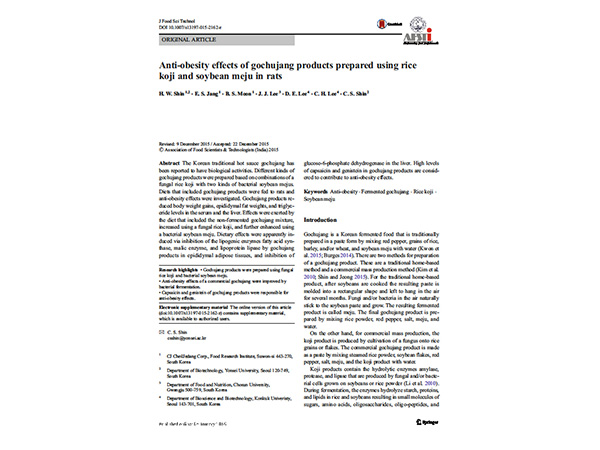CJ CheilJedang’s article on the effect of gochujang on body fat reduction has been published in an international journal, winning global recognition
- CJ CheilJedang proved the effect of gochujang that applied its patented strain on reducing body fat
- The article is published in the ‘Journal of Food Science & Technology’, a prestigious international journal in the field of food science and nutritional science

The body fat reduction effect of the traditional Korean fermented soybean product, gochujang, has earned global praise. CJ CheilJedang announced that its article, which proved the body fat reduction effect of gochujang, has been published in the ‘Journal of Food Science & Technology,’ an international journal in the field of food science and nutritional science. This journal is a prestigious international journal that publishes the latest research findings in all fields of food and nutritional science, and it ultimately approved publication of this article that proved the body fat reduction effect of gochujang developed using CJ’s own strain through animal testing.
The body fat reduction effect of gochujang has been constantly studied in related industries and organizations, but the articles were mostly concerning the ingredients of gochujang such as hot pepper or capsaicin, or specific components of hot pepper, while very few studies on the effect of gochujang itself were actually published in an international journal in the form of an official research article. Thus, the publication of this article will work to provide global publicity to the excellent functions of Korean fermented soybean products based on scientific grounds.
The key point of this article is that, as a result of performing animal testing on the anti-obesity effects of gochujang, the experimental group having an intake of fermented gochujang that applied CJ CheilJedang’s own new strain showed a decrease in obesity-related indicators such as weight and body fat. The experimental group on a high-fat diet with fermented gochujang exhibited about 14% lower weight and 18% lower fat than
the experimental group on a high-fat diet without gochujang. The blood neutral lipid and cholesterol levels also decreased, accumulation of fat in the liver was suppressed, and the size of fat cells decreased as well.
The study also discovered that the fermentation process of gochujang itself helps reduce body fat. Compared to non-fermented gochujang that merely mixed the ingredients such as hot pepper and rice, gochujang that was fermented with a self-developed strain showed a greater body fat reduction effect. This proved that aside from capsaicin’s effect in hot pepper, the fermentation substance created by the effect of the strain also has a correlation with anti-obesity effects.
This study has been conducted by CJ CheilJedang in close cooperation with Chosun University and Konkuk University. It is differentiated from others as it determined the body fat reduction effect with industrialized gochujang sold in the market instead of traditional gochujang. The study was conducted using Haechandle Gochujang that can be purchased in the market by consumers, which is fermented with CJ CheilJedang’s self-developed new strain ‘CJ 1354 (Patent No. 10-1489999-0000)’. “Having this article published proved the body fat reduction effect of gochujang both scientifically and academically, thereby providing the excellence of Korean food that has been just vaguely known to be healthy,” said Hye-Won Shin, principal researcher at the Fermented Food Center of CJ CheilJedang Food Research Institute. “By actively linking the excellent functionality of Korean fermented soybean products with product marketing, we’ll be able to turn it into a healthy macrobiotic food on a global scale.”
Since 2001, CJ CheilJedang has been conducting studies on fermentation strains and related technology to restore and standardize traditional fermented soybean products. The company has begun research with samples of over 2,000 types of native strains by collecting samples from the masters of traditional fermented soybean products and meju from all over the country. CJ CheilJedang also applied for the patent of 4 strains with excellent taste quality in 2012 and began leveraging their attributes. In addition to applying self-developed strains to the product, the company plans to conduct more intensive research on the complex fermentation of microorganisms and various underlying effects of traditional fermented soybean products and kimchi which are ‘traditional probiotics.’ <The end>